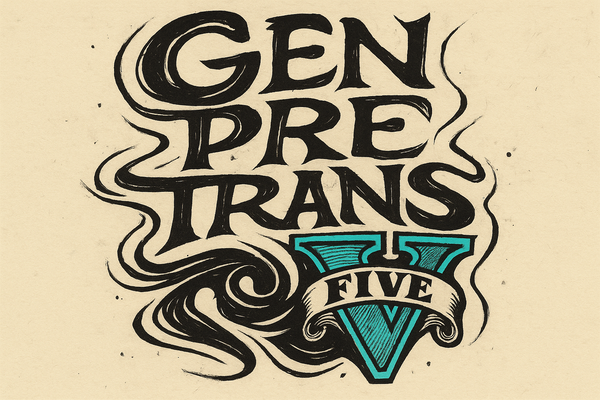ImaginEconomy Daily #15
Google DeepMind's Genie 3 promises infinite worlds. ElevenLabs democratizes music creation. ChatGPT passes 700 million users. Yet most companies can't yet implement even basic AI effectively at scale.

ImaginEconomy 🧠 ✨ 💰 : Brands, Strategy, Story and Design in the Age of AI
Google DeepMind's Genie 3: When AI Becomes the Ultimate World Builder
Google DeepMind unveiled Genie 3, an AI system that generates fully interactive 3D worlds from text prompts, running in real-time at 24 frames per second and 720p resolution. The model maintains environmental consistency for several minutes, remembers what it previously generated even when objects leave view, and allows users to dynamically alter simulations mid-experience through "promptable world events." DeepMind calls it a crucial stepping stone toward AGI (why not 'Holodeck'?), capable of training AI agents in unlimited simulated environments without the constraints of real-world physics engines.
ImaginEconomy Impact: Forget everything you know about content creation. When AI can generate infinite, interactive worlds from a sentence, we're not just disrupting gaming or entertainment; we're obliterating the concept of scarcity in digital experiences. For brands, this isn't about prettier ads or better product visualizations. It's about the end of production constraints. Imagine launching a product not with a content campaign but with an entire explorable universe. Customer journeys become literal journeys through branded worlds that adapt in real-time to each visitor. The terrifying efficiency here is that Genie 3 learns physics by observation, not programming. It doesn't need to be told how water flows or fire burns; it figures it out. When world-building becomes as simple as writing a prompt, the only remaining moat is imagination itself. And that's a resource many brands have systematically optimized out of existence.
Source: Google DeepMind announces Genie 3
ElevenLabs Drops the Beat: Studio-Grade Music Generation for Everyone
It was only a matter of time, and this week ElevenLabs indeed launched Eleven Music, an AI-powered music generation platform that creates complete tracks from natural language prompts with full commercial licensing rights. Unlike competitors Suno and Udio who face copyright lawsuits, ElevenLabs secured deals with Merlin Network and Kobalt Music Group, representing artists like Adele, Nirvana, and Childish Gambino. The system offers complete control over genre, style, vocals, multilingual support, and can generate studio-quality tracks at 44.1kHz in minutes. Artists must opt-in to have their music used for training, creating a legally-cleared alternative in the contentious AI music space.
ImaginEconomy Impact: The AI music industry just experienced its Spotify moment: disruption now comes with licensing deals and corporate handshakes. ElevenLabs didn't just build a music generator, but a legal cover for the commoditization of commercial soundtracks. When any brand can generate infinite variations of perfectly licensed music for $20/month, the economics of audio branding shift fundamentally. The real disruption isn't in replacing composers: it's in removing the excuse for mediocre sound design. Every TikTok, every ad, every piece of content can now have custom, contextual music. The brands that win won't be those generating the most tracks but those who understand that when music becomes infinite, curation becomes invaluable. Watch the smart money pivot from music creation to music connoisseurship.
Source: ElevenLabs announces Eleven Music
ChatGPT's 700M User Milestone: When 13% of Humanity Speaks to One Machine
ChatGPT will hit 700 million weekly active users this week, up from 500 million in March and representing a 4x year-over-year surge. The milestone spans all ChatGPT products with daily messages surpassing 3 billion, while OpenAI now counts 5 million paying business customers, up from 3 million in June. Users engage with the platform an average of 12 days per month, second only to Google and X, spending 16 minutes per day on average. The growth accelerated after launching GPT-4's image generation capabilities, with users creating hundreds of millions of images in just the first week.
ImaginEconomy Impact: Seven hundred million people talking to a machine every week isn't just adoption: it's annexation. ChatGPT has become cognitive infrastructure, as essential as email and more intimate than therapy. The 4x growth isn't slowing; it's accelerating because each new user makes the next one more likely; if your colleague is using it, you better start learning. Network effects meet neural networks. For brands still debating their AI strategy, the market has already decided for them: your customers and staff are cyborgs now, outsourcing chunks of their thinking to OpenAI's servers. When 13% of online humanity uses the same AI assistant, we're witnessing the largest standardization of thought in human history. Every brand message, every creative brief, every strategic decision gets filtered through the same silicon oracle. The implications are yet to be felt fully, but are surely on the way.
Source: OpenAI ChatGPT reaches 700 million users
The AI Implementation Rift: When Leaders Think They're Winning But Workers Know Better
A massive perception gap exists between leadership and employees on AI implementation success, with only 45% of employees believing their company's AI rollout has been successful versus 75% of C-suite executives. Research shows employees are three times more likely to be using generative AI than their leaders expect. 13% of employees report using AI for over 30% of daily tasks while leaders estimate only 4%. Meanwhile, 35% of employees are paying out-of-pocket for AI tools because their company's solutions don't work, and 57% of employees say their company doesn't even have an AI strategy while 89% of executives believe they do.
ImaginEconomy Impact: The emperor has no clothes, but he's convinced he's wearing Loro Piana. This is more than an implementation gap; it's a reality schism. While C-suites celebrate their AI transformations in boardrooms, employees are secretly subscribing to ChatGPT Plus with their own credit cards because the enterprise solution is unusable garbage. The 35% paying out-of-pocket aren't rebels but survivalists navigating corporate incompetence. This disconnect reveals the fundamental lie of enterprise AI: companies are performing AI, not realizing AI; it's theatrical deployment of half-baked tools no one uses except in mandatory demos. Meanwhile, shadow AI spreads through organizations like digital kudzu, unmanaged and ungoverned. The brands that survive won't be those with the best AI strategy on paper, but those brave enough to ask their employees what they're actually using.
Source: McKinsey report on AI workplace disconnect
DoubleVerify's Meta Expansion: AI-Powered Brand Safety Gets Real
DoubleVerify expanded its AI-powered brand suitability measurement across 30 content categories on Meta's Facebook and Instagram Feeds and Reels, offering post-bid measurement and content-level controls in 34 languages. The expansion leverages DV's Universal Content Intelligence engine, which analyzes video, image, audio, speech, and text to deliver scalable content classification. With key frame extraction for efficient video analysis, advertisers can now proactively avoid unsuitable content before ads are served, with automated hourly refreshes requiring no manual intervention.
ImaginEconomy Impact: Brand safety just graduated from theatre to science. DoubleVerify's expansion isn't just about protecting brands from bad content; it's about the algorithmic privatization of context. When AI decides what's suitable across 30 categories in 34 languages, we're not measuring safety: we're manufacturing and monetizing it. The deeper game here is control arbitrage. Meta owns distribution. DoubleVerify owns verification. And brands need to pay both for the privilege of reaching audiences they no longer understand on platforms they can't control. Every new safety category is another toll booth on the attention highway. The smart money isn't on brands that achieve perfect safety scores but on those who realize that in a world of infinite content, the most dangerous position is perfect safety: because that's where effective brand differentiation goes to die.
Source: DoubleVerify expands Meta brand suitability measurement
Voice Search Crosses 50%: The Keyboard's Still Around, But Less Than Before
Over 50% of all online searches are now voice-based, with 72% of smart speaker owners using them to find local businesses and 28% of those searchers going on to call the business they found. Voice assistants can answer 93.7% of search queries accurately, with Google Assistant understanding queries 100% of the time and delivering correct answers 93% of the time. The shift is generational: 65% of 25-49 year-olds speak to their devices daily. Voice commerce is growing fast and projected to hit $100 billion by 2026.
ImaginEconomy Impact: The keyboard isn't dying but it's already gone for half of all searches. Humans prefer talking to typing, and the recent explosion in machine capability to understand it is leading to a cognitive revolution. Voice search rewards the conversational, punishes the keyword-stuffed, and murders traditional SEO. But voice search isn't really search at all: it's conversation, collaboration, and commands. "Find me a pizza place" becomes "Figure out the celiac dairy-free pescatarian options" becomes "Order me a pizza." The entire consideration funnel collapses into a scatterbrained utterance. For brands, this means the carefully crafted customer journey just became teleportation that brands don't control. The winners won't be those optimizing for voice search but those who understand that when people talk instead of type, they reveal not what they think they want in their aspirational future, but what they actually need in the moment.
Source: Voice search statistics and adoption data
OpenAI's Study Mode: When AI Becomes Your Socratic Tutor
Recent education research supports using AI for teaching as long as it's used right: supporting the student's own thought processes instead of giving ready-made answers. With this in mind, OpenAI just launched Study Mode in ChatGPT, transforming the AI from an output machine into an interactive tutor that uses Socratic questioning and scaffolded responses. Built with input from educators at 40+ institutions, the feature assesses skill levels, remembers progress across chats, and actively resists giving direct answers. Instead it guides users through problems step-by-step. When students request quick answers, it responds: "The point of this is to learn, not just to give you the answer." One in three college-aged Americans now use ChatGPT, with learning as the top use case.
ImaginEconomy Impact: OpenAI just performed the ultimate flip: turning a cheating tool into a teaching tool with a toggle switch. But Study Mode reveals something darker than academic dishonesty: it exposes education's fundamental crisis and the complete inability of institutional learning to keep up with technology. When an AI delivers personalized Socratic dialogue better than most human teachers, we're not just augmenting education; we're admitting its failure. The feature that remembers progress across chats means ChatGPT knows your intellectual development better than ANY teacher who sees you one to three hours a week. For brands, this is a preview of your future customer: someone who expects every interaction to be personalized and beneficial. The terrifying beauty of Study Mode is that it can make learning addictive. When education becomes as engaging as social media, knowledge can become the new dopamine. What's not to like?
Source: OpenAI introduces Study Mode
Bottom Line: The Simulation Surplus
Today's developments reveal an industry sprinting toward infinite abundance while stumbling over basic implementation. DeepMind generates worlds. ElevenLabs generates music. ChatGPT generates conversations with 700 million humans.
Yet most companies can't even get their employees to use the AI tools they've purchased.
We're living through the simulation surplus: unlimited synthetic everything: worlds, music, tutors, and content. All the while the real business world struggles to integrate any of it meaningfully. The gap between what's possible and what's widely practiced at scale has never been wider.
The connecting thread is trust, or its absence. Employees don't trust corporate AI. Brands don't trust AI-generated content. Educators don't trust AI tutors. Everyone's using AI anyway, just secretly, guiltily, with their own money and on their own time. Because they feel they have to.
The revolution isn't coming. It's already here, hidden in browser tabs employees quickly close when bosses walk by.
ImaginEconomy Daily Newsletter is curated for brand, business and marketing strategists, creatives, and leaders navigating the intersection of technology and human experience.




